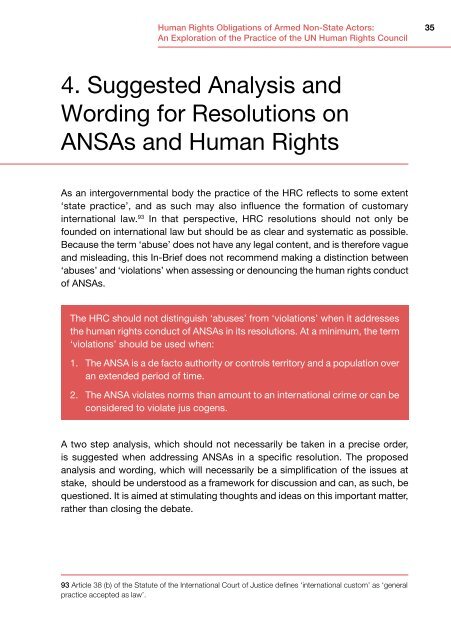InBrief7_web
InBrief7_web
InBrief7_web
Create successful ePaper yourself
Turn your PDF publications into a flip-book with our unique Google optimized e-Paper software.
Human Rights Obligations of Armed Non-State Actors:<br />
An Exploration of the Practice of the UN Human Rights Council<br />
35<br />
4. Suggested Analysis and<br />
Wording for Resolutions on<br />
ANSAs and Human Rights<br />
As an intergovernmental body the practice of the HRC reflects to some extent<br />
‘state practice’, and as such may also influence the formation of customary<br />
international law. 93 In that perspective, HRC resolutions should not only be<br />
founded on international law but should be as clear and systematic as possible.<br />
Because the term ‘abuse’ does not have any legal content, and is therefore vague<br />
and misleading, this In-Brief does not recommend making a distinction between<br />
‘abuses’ and ‘violations’ when assessing or denouncing the human rights conduct<br />
of ANSAs.<br />
The HRC should not distinguish ‘abuses’ from ‘violations’ when it addresses<br />
the human rights conduct of ANSAs in its resolutions. At a minimum, the term<br />
‘violations’ should be used when:<br />
1. The ANSA is a de facto authority or controls territory and a population over<br />
an extended period of time.<br />
2. The ANSA violates norms than amount to an international crime or can be<br />
considered to violate jus cogens.<br />
A two step analysis, which should not necessarily be taken in a precise order,<br />
is suggested when addressing ANSAs in a specific resolution. The proposed<br />
analysis and wording, which will necessarily be a simplification of the issues at<br />
stake, should be understood as a framework for discussion and can, as such, be<br />
questioned. It is aimed at stimulating thoughts and ideas on this important matter,<br />
rather than closing the debate.<br />
93 Article 38 (b) of the Statute of the International Court of Justice defines ‘international custom’ as ‘general<br />
practice accepted as law’.


